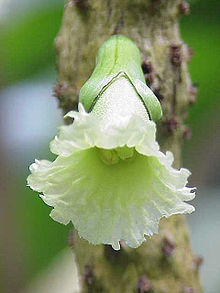Bignoniaceae
| Bignoniaceae | |
|---|---|
 |
|
| Bigleaf black calabash (Amphitecna macrophylla) | |
| Scientific classification | |
| Kingdom: | Plantae |
| (unranked): | Angiosperms |
| (unranked): | Eudicots |
| (unranked): | Asterids |
| Order: | Lamiales |
| Family: |
Bignoniaceae Juss. |
| Type genus | |
|
Bignonia Linnaeus |
|
| monophyletic groups | |
|
Jacarandeae |
|
| Synonyms | |
|
|
|
Jacarandeae
Tourrettieae
Argylia
Tecomeae
Delostoma
Bignonieae
Oroxyleae
Catalpeae
"Tabebuia alliance"
"Paleotropical clade"
incertae sedis:
Bignoniaceae is a family of flowering plants in the order Lamiales commonly known as the bignonias. It is not known to which of the other families in the order it is most closely related.
Nearly all of the Bignoniaceae are woody plants, but a few are subwoody, either as vines or subshrubs. A few more are herbaceous plants of high-elevation montane habitats, in three exclusively herbaceous genera: Tourrettia, Argylia, and Incarvillea. The family includes many lianas, climbing by tendrils, by twining, or rarely, by aerial roots. The largest tribe in the family, called Bignonieae, consists mostly of lianas and is noted for its unique wood anatomy.
The family has a nearly cosmopolitan distribution, but is mostly tropical, with a few species native to the temperate zones. Its greatest diversity is in northern South America. The family has been covered in some major floristic projects, such as Flora of China, Flora Malesiana, and Flora Neotropica. It has not yet been covered in some others, such as Flora of Australia, and Flora of North America.
...
Wikipedia
